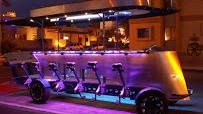In this multi-part series, we will be looking at some of the laws that Governor Doug Ducey signed during the 1st Regular Session of Arizona’s 52nd Legislature. You can see Part 1: Food and Drink here. Unless otherwise stated, all laws discussed below went into effect on July 3. We will not cover all of the 278 bills signed into law, but if there is a particular bill you are interested in, please email Emily at [email protected] and we will try to include it in an upcoming post.
This post will look at new laws related to motor vehicles.
HB 2135 – Transportation Network Companies
HB 2135 was one of the hot topic bills during this past session. Legalizing rideshare services such as Uber and Lyft, HB 2135 was the result of extensive stakeholder meetings between the bill’s sponsor, Rep. Karen Fann (R-Prescott) and industry stakeholders including rideshare companies, taxi companies and representatives of the insurance industry. In addition to legalizing rideshare services, the bill outlines insurance and registration requirements to protect both employees and consumers. A similar bill was passed by both the House and the Senate only to be vetoed by Governor Jan Brewer in 2014. In her veto message, Governor Brewer cited concerns with consumer safety related to employees undergoing pre-employment and random drug testing and gaps in insurance coverage. The final version, HB 2135, resolved both of these concerns.
HB 2211 – Motorized Quadricylces; Restrictions

An example of a “party bike” in Scottsdale, AZ. Image from the Phoenix Business Journal.
Introduced by Rep. Warren Petersen (R-Gilbert), HB 2211 classifies “party bikes” as limousines. Party bikes are motorized quadricycles that are self-propelled by an emission-free electric motor and seat at least 8 passengers. The multi-seat vehicles are popular in many downtown areas, including Old Town Scottsdale. This classification allows those sitting in the back of the vehicle to consume alcohol while on the vehicle. The bill also requires party bikes to be registered with the Department of Weights and Measures, prohibits the vehicle from traveling over 15 miles per hour, and proscribes it from being driven on a highway with a posted speed of more than 35 miles per hour.
HB 2236 – ATV Motorcycle Passengers
HB 2236 was introduced by Rep. TJ Shope (R-Coolidge) and prohibits the driver of an all-terrain vehicle (ATV) from carrying passengers unless the ATV is equipped to carry more than one person. According to committee testimony, this bill is intended to prevent injuries to passengers who ride on ATVs that are not equipped for multiple passengers.
HB 2308 – Defensive Driving School; Eligibility
Sponsored by Rep. Eddie Farnsworth (R-Gilbert), HB 2308 allows individuals who receive a citation for a “civil traffic moving violation” to attend defensive driving school once every twelve months, down from once every twenty-four months. Successful completion of the course will result in the dismissal of the civil traffic citation, per A.R.S. §28-3394.
HB 2345- Motorcycles; All-Terrain Vehicles; Cycles; Equipment
HB 2345, sponsored by Rep. Karen Fann (R-Prescott), allows motorcycles, ATVs and motor driven cycles to have handlebars positioned above shoulder height. Additionally, HB 2345 removes the requirement for the same vehicles to have handrails for passengers. Testimony in support of the bill stated these types of handlebars are legal in surrounding states, which has caused visitors from those states to be penalized when driving through Arizona.
HB 2365 – Off-Highway Vehicles; Enforcement
HB 2365 allows peace officers and other authorized state employees to enforce off-highway vehicle regulations across multiple jurisdictions. Previously, officers and other state employees were only permitted to enforce regulations on land solely under state or county jurisdiction or land that is open as indicated by federal law. Sponsored by Rep. Bob Thorpe (R-Flagstaff), the bill also modifies the definition of “off-highway vehicle” to exclude vehicles used in mining.
HB 2422 – Vehicle Towing
Sponsored by Rep. Karen Fann (R-Prescott), HB 2422 removes the requirement that tow truck drivers obtain a bond before providing service. Additionally, HB 2422 changes contract agreement lengths with the Department of Public Safety. Now, if a towing firm acquires another towing firm via a contractual agreement with the Department, that contract is valid for one year after the acquisition date or until the end of the contractual agreement with the Department, whichever is shorter. Previously, the agreement was valid for one year after the date of acquisition.
SB 1051 – Autocycles; Class M License; Exemption
SB 1051, sponsored by Sen. Judy Burges (R-Sun City), statutorily defines autocycle as a three-wheeled motorcycle with “a completely enclosed seating area that is equipped with a roll cage, safety belts for each occupant and antilock brakes and that is designed to be controlled with a steering wheel and pedals.” SB 1051 also removes the requirement for autocycle operators to have a Class M license, which is required for traditional motorcycles and mopeds.
Stay tuned for the next post in this multi-part series on laws passed by the 52nd Legislature.

